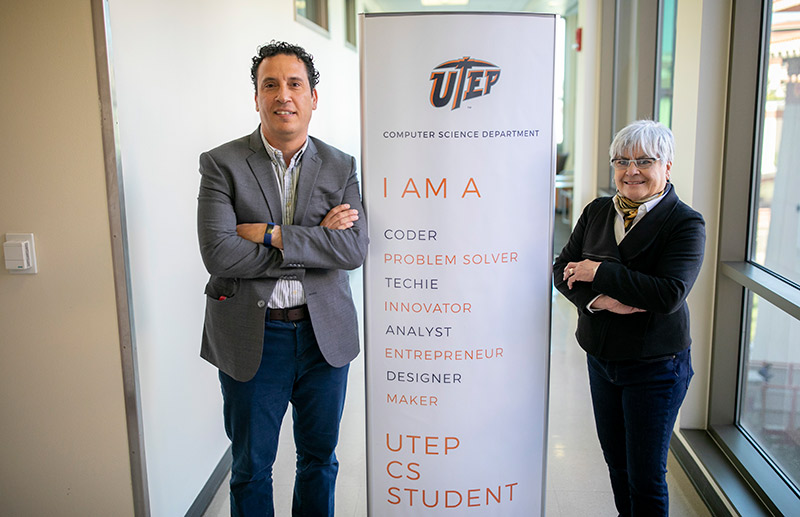UTEP Receives Department of Education Grant to Create Professional Leadership Courses
Last Updated on November 12, 2019 at 12:00 AM
Originally published November 12, 2019
By UC Staff
UTEP Communications
The University of Texas at El Paso’s Department of Computer Science was awarded a $742,000 grant from the U.S. Department of Education to develop courses designed to challenge students while positioning them to thrive in the workforce. The program also will focus on professional development for faculty and learning assistants.

Salamah Salamah, Ph.D., associate professor of computer science, is the grant’s principal investigator. He, along with co-investigators Elsa Villa, Ph.D., associate director of the Center for Education Research and Policy in the College of Education; Martine Ceberio, Ph.D., professor of computer science; and Christina Convertino, Ph.D., assistant professor and ethnographic researcher in the College of Education, will develop the curriculum and teach new one-credit hour courses focused on enhancing students’ leadership skills.
The team will pilot the first of three courses in spring 2020. The courses will be structured around a relational leadership framework that focuses on interpersonal and professional skills, which include the ability to work in a team, ethics, communication, cooperation, problem solving, financial literacy and ways to benefit the common good. Relational leadership refers to a model or perspective on leadership that focuses on the idea that a collective of individuals can accomplish change by being socially responsible, ethical and inclusive.
Students will receive support for undergraduate research experiences, study abroad, and conference travel, aligning with the UTEP Edge, which gives students opportunities to engage in high-impact experiences. To learn more about UTEP EDGE go to https://www.utep.edu/edge/.
The project will involve other UTEP faculty by offering workshops to teach the aforementioned courses following the nationally used Affinity Research Group framework developed at UTEP more than 20 years ago. Faculty will learn how to create a more inclusive classroom environment, meeting students where they are and developing a sense of belonging among students.
This effort is an emergent evidence-based practice that will eventually be disseminated across the Computing Alliance for Hispanic Serving Institutions (CAHSI), a national INCLUDES Alliance funded by the National Science Foundation and led by Ann Gates, Ph.D., chair of computer science. The CAHSI INCLUDES Alliance is comprised of over 60 Hispanic-serving institutions, industry partners and other stakeholders who are committed to growing and sustaining a networked community to recruit, retain and accelerate the progress of Hispanics in computing.
“Our students in computer science are really successful in securing jobs,” Salamah said. “With these leadership skills, they will be able to secure better positions and advance their careers. This will create more mobility in the workforce and ultimately, these skills will help advance our students in the workplace.”